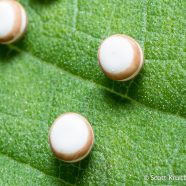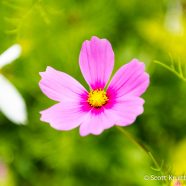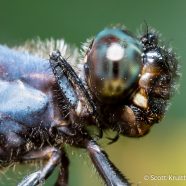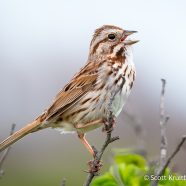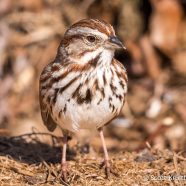Unknown Eggs
I found these eggs last month on Pineapple Sage (Salvia elegans) and Butterfly Bush (Buddleia) leaves. This macro view lets you see they are mostly white, not quite spherical, and feature two gold bands. They are certainly tiny, and they are almost certainly moth eggs…but what species? I have enough of a difficult time sorting through the hundreds and hundreds of adult moths we see, let alone eggs! The closest match that I could find were those of the Polyphemus Moth (Antheraea polyphemus) which would be exceptional. I saw some caterpillars had emerged with broken eggs and some snacked...
Read MoreCosmos Flowers
What better way to enjoy art in August than with some more of the most stunning natural sights of summer? Cosmos flowers really stand out from the crowd and look great against the green, almost appearing like a painting.
Read MoreSpangled Skimmer
Here is a male Spangled Skimmer (Libellula cyanea) which felt very appropriate for the Fourth of July. Happy Independence Day to all! We hope you are enjoying the holiday outside with our natural friends.
Read MoreSinging Song
This can be the quietest time of the season for some Song Sparrows (Melospiza melodia) as they keep their incessant and resonant voices down after having established territory, found a mate, and successfully built a nest. You do not want to advertise quite as much when there are eggs and young to protect, but sometimes you do have to keep an eye on your property and belt out a tune or two.
Read MoreSong Sparrow
What is one thing nearly all of the sparrows have in common? Those special earth tones, with varying shades of brown making up a lot of their appearance because they are ground-based birds. This Song Sparrow was showing that off with its camouflage working wonderfully and apparently letting it feel comfortable enough to let me shoot these close-up photos. They really are brilliant little birds, and I mean that for all the many subspecies of Song Sparrow in the world. One wonders how many of these would or will evolve to completely different species over time. Even now it is vital to always...
Read More



